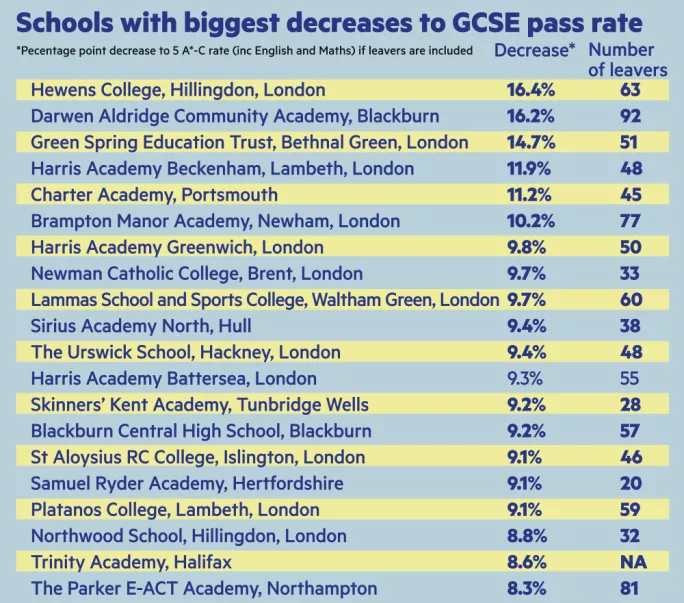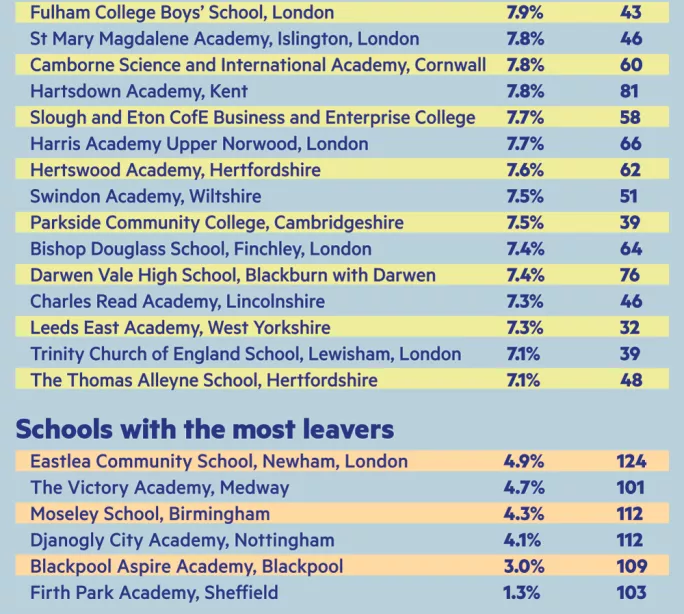
Do schools really get rid of pupils to climb league tables?

Research published last week contained apparently shocking revelations suggesting that unnamed secondaries had moved pupils from their schools to boost league table positions.
Education Datalab - the organisation behind the study - has called on the government to act on its findings and address schools’ “gaming” of the exam league tables.
It concluded that, in some cases, pupils were being “managed out” of mainstream secondaries to prevent their results counting towards schools’ GCSE scores.
If there is any truth to that at all, then the implications are enormous. It would suggest that the accountability system has had such a distorting effect on schools’ decision-making that some are now prepared to jeopardise pupils’ futures just so that they can artificially inflate their own performance.
But would they really use such cynical tactics? TES has now been handed a full dataset - based on pupils who left from the 2015 GCSE cohort - and so has been able to ask the schools involved directly.
The research shows that, in total, there were 129 secondaries in England where the proportion of pupils achieving five or more A* to C GCSE grades, including English and maths, in 2015 would have fallen by at least 5 percentage points if results from pupils who left before October in Year 11 had been included.
One immediate pattern is that two of the country’s most prominent academy chains have a disproportionately large representation. The Harris Federation had eight academies among the 129 schools, and Ark had six.
High student turnover
So what are the explanations offered by these schools? TES contacted both academy chains as well as every secondary on the two tables opposite.
The main table shows the 35 secondaries gaining by at least 7 percentage points on their GCSE scores through early leavers. The second table shows the six schools where more than 100 pupils left early and scores improved as a result.
Summaries of the responses received from schools, or their trusts, are included here or in the box to the left. Most suggested that the pupils had moved because of circumstances beyond the school’s control.
Reasons given included high pupil turnover as a result of deprivation and immigration, and the “mobility issue”.
Some of the schools pointed to specific circumstances, such as uncertainties over possible closure or takeover.
Michael Gosling, CEO of Trinity Academy in Halifax, called the data “one-sided”, saying that 150 students in the 2015 cohort had been taken in from a neighbouring school that had been in special measures.
But the analysis takes account of pupils joining as well as leaving schools and weights a school’s results proportionally according to the amount of time each pupil spent there.
Blackburn Central High School appeared to admit that it had a role in pupils’ early departure. Its GCSE score would have fallen by 9.2 percentage points if early leavers had been included.
‘No agency appears to be investigating the case of these disappearing children’
Deputy head Shanaz Hussain said: “If we take them off-roll - if it’s a young girl who perhaps is pregnant or it’s someone whose home life is very, very erratic - then it does have a positive impact. But sometimes taking them off-roll is a very lengthy process, and it’s not always successful.”
As for the academy chains, Harris cited pupil mobility, saying that “as a London sponsor with most of our schools in disadvantaged areas, it is no surprise that we would be affected by this”.
A spokesperson said: “These schools came from challenging starting points, with many having been in special measures. Although they are now rated ‘good’ or ‘outstanding’, the impact of special measures - with parents wanting to remove their children before and after the Ofsted judgement - is significant.”
All the Harris schools referred to in the analysis continued to have a high proportion of disadvantaged pupils, she added.
Some of the data for four of the secondaries related to predecessor schools before they became academies, she said. The churn in Year 11 at Harris academies was “in most cases zero and in all cases well below average”, the spokesperson added.
Ark said it only took on schools in areas of economic deprivation or that had a history of underperformance, “so it’s not surprising that we have a relatively high level of student mobility at our schools”.
The other pattern in the analysis that stands out is that of the 100 schools where leavers had the biggest positive effect on GCSE results, nearly half (49) were in London.
There is high pupil mobility in the capital, so could it be that this issue rather than schools “gaming” the system is the main reason behind the figures?


DfE ‘concerns’
Education Datalab researcher Philip Nye said that although high mobility did affect the data, it was far from the whole story: “There are a number of other schools with high levels of mobility that don’t see the same impact on their GCSE scores from pupils leaving early,” he noted.
Mary Bousted, general secretary of the ATL teaching union, was similarly unconvinced, and has demanded action.
“No government agency appears to be investigating the case of these disappearing children,” she said in an online TES comment piece, published this morning.
“Ofsted routinely awards Harris academies ‘outstanding’ inspection judgements. Nor has there, as far as I am aware, been any official intervention by regional schools commissioners into those schools whose Year 11 cohorts show significant pupil shrinkage.”
There are signs that something may be stirring in Sanctuary Buildings, however. One of the schools that TES contacted said the Department for Education had been in touch about the issue.
But when asked to comment, the DfE would only say: “Statutory guidance is clear that exclusions can only be issued on disciplinary grounds, and that decisions to exclude must be lawful, reasonable and fair.
“In addition, schools must also follow clear rules when taking any decisions to remove a pupil from their register.”
You need a Tes subscription to read this article
Subscribe now to read this article and get other subscriber-only content:
- Unlimited access to all Tes magazine content
- Exclusive subscriber-only stories
- Award-winning email newsletters
- Unlimited access to all Tes magazine content
- Exclusive subscriber-only stories
- Award-winning email newsletters
You need a subscription to read this article
Subscribe now to read this article and get other subscriber-only content, including:
- Unlimited access to all Tes magazine content
- Exclusive subscriber-only stories
- Award-winning email newsletters
- Unlimited access to all Tes magazine content
- Exclusive subscriber-only stories
- Award-winning email newsletters



